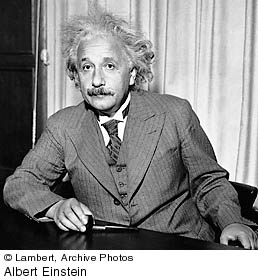
6. The new physics (throughout the 1900's)
The field of physics was
revolutionized by Albert Einstein's theories of relativity, the emergence
of quantum mechanics, and the development of atomic and hydrogen bombs.

A new scientific description
of the physical world emerged. This description contained ideas that
challenged common sense and earlier science, such as: (1) Space
is finite and is bent by gravity. (2) Light can be both a particle and
a wave. (3) Physical
events have to be described statistically, not by determinate cause-
and-effect. (4) For
subatomic systems, the observer can't stand outside the system to see
it purely objectively.
These ideas and theories
became visible in cyclotrons, accelerators, and other "atom smashers,"
but even more spectacularly and with terrifying power in nuclear and
thermonuclear bombs. The fear that humankind's highest scientific achievements
will destroy the world became very real, and politicians struggled to
deal with the threat of nuclear war. |


